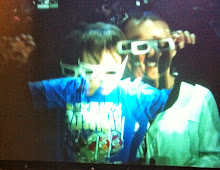As soon as we landed in St. Louis, I asked my uncle whether riverboats still cruise up and down the Mississippi River. Industrious fellow that he is, he found out (via the internet) that there are still a couple riverboat outfits in St. Louis. He got pretty excited about the prospect of riding on a paddlewheeler; apparently he'd never been on one, despite having lived his whole life in the greater St. Louis area. We collectively decided that we'd all go for a riverboat ride on Monday.
I wanted to take Parker on a paddlewheel boat because it was pretty much the only kind of boat he'd yet to experience in his short life. Growing up on a small island, you get exposed to all sorts of watercraft just during the course of your daily life: sailboats (monohull, catamaran and trimaran), motorboats, fishing boats, kayaks, canoes, barges, ferries, cruise ships and container ships. We've talked about how each type works, in addition to their individual purposes. I was more than jazzed to show Parker a riverboat with an honest-to-goodness paddlewheel, since that's the one kind of boat (well, apart from some Navy vessels) that neither of us had neither seen nor ridden on before.
The boat ride was a blast, and educational besides. The captain continually pointed out both historical landmarks and present-day industries (who knew that they harvest sand from the river bottom?). Parker and I talked about how fast the river was moving, the tugboats that were pushing up to eleven river barges up the river, the plentiful driftwood (as well as trash) floating past us and where all the river water would end up. It was great fun, though sweltering. We had the fortunate option of descending down into the air-conditioned dining hall, but doing so I couldn't help but imagine the poor souls who cruised the river aboard paddlewheel boats a hundred years ago, dressed to the nines and forced to bake in the Midwest summer heat.






































